过去分词作定语与表语
- 格式:doc
- 大小:104.00 KB
- 文档页数:14
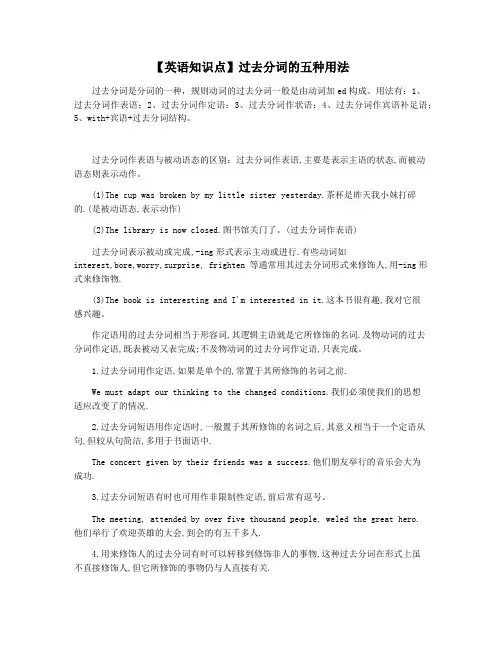
【英语知识点】过去分词的五种用法过去分词是分词的一种,规则动词的过去分词一般是由动词加ed构成。
用法有:1、过去分词作表语;2、过去分词作定语;3、过去分词作状语;4、过去分词作宾语补足语;5、with+宾语+过去分词结构。
过去分词作表语与被动语态的区别:过去分词作表语,主要是表示主语的状态,而被动语态则表示动作。
(1)The cup was broken by my little sister yesterday.茶杯是昨天我小妹打碎的.(是被动语态,表示动作)(2)The library is now closed.图书馆关门了。
(过去分词作表语)过去分词表示被动或完成,-ing形式表示主动或进行.有些动词如interest,bore,worry,surprise, frighten 等通常用其过去分词形式来修饰人,用-ing形式来修饰物.(3)The book is interesting and I'm interested in it.这本书很有趣,我对它很感兴趣。
作定语用的过去分词相当于形容词,其逻辑主语就是它所修饰的名词.及物动词的过去分词作定语,既表被动又表完成;不及物动词的过去分词作定语,只表完成。
1.过去分词用作定语,如果是单个的,常置于其所修饰的名词之前.We must adapt our thinking to the changed conditions.我们必须使我们的思想适应改变了的情况.2.过去分词短语用作定语时,一般置于其所修饰的名词之后,其意义相当于一个定语从句,但较从句简洁,多用于书面语中.The concert given by their friends was a success.他们朋友举行的音乐会大为成功.3.过去分词短语有时也可用作非限制性定语,前后常有逗号。
The meeting, attended by over five thousand people, weled the great hero.他们举行了欢迎英雄的大会,到会的有五千多人.4.用来修饰人的过去分词有时可以转移到修饰非人的事物,这种过去分词在形式上虽不直接修饰人,但它所修饰的事物仍与人直接有关.The boy looked up with a pleased expression.男孩带着满意的表情举目而视。
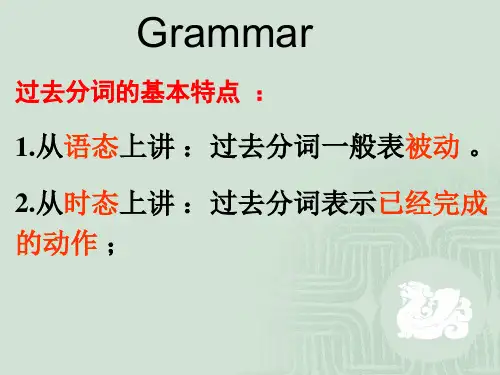
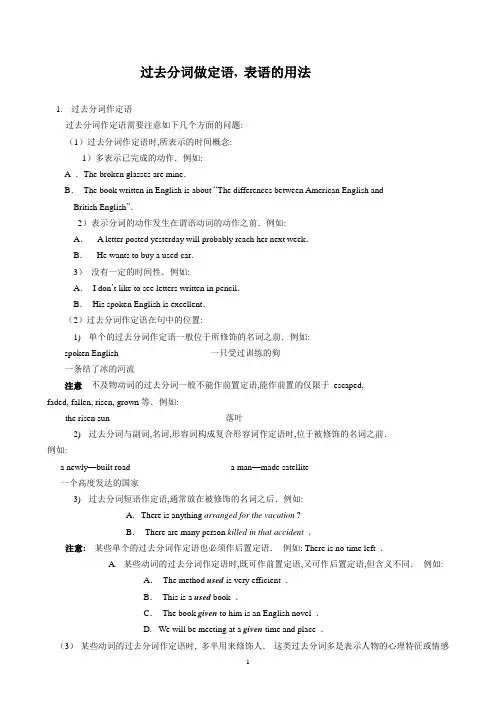
过去分词做定语, 表语的用法1.过去分词作定语过去分词作定语需要注意如下几个方面的问题:(1)过去分词作定语时,所表示的时间概念:1)多表示已完成的动作.例如:A.The broken glasses are mine.B.The book written in English is about “The differences between American English andBritish English”.2)表示分词的动作发生在谓语动词的动作之前.例如:A.A letter posted yesterday will probably reach her next week.B.He wants to buy a used car.3)没有一定的时间性.例如:A.I don’t like to see letters written in pencil.B.His spoken English is excellent.(2)过去分词作定语在句中的位置:1)单个的过去分词作定语一般位于所修饰的名词之前.例如:spoken English _________________ 一只受过训练的狗____________________一条结了冰的河流_____________________注意不及物动词的过去分词一般不能作前置定语,能作前置的仅限于escaped,faded, fallen, risen, grown等.例如:the risen sun ______________________ 落叶_______________________2)过去分词与副词,名词,形容词构成复合形容词作定语时,位于被修饰的名词之前.例如:a newly—built road __________________ a man—made satellite _________________一个高度发达的国家________________________3)过去分词短语作定语,通常放在被修饰的名词之后.例如:A.There is anything arranged for the vacation ?B.There are many person killed in that accident .注意:某些单个的过去分词作定语也必须作后置定语.例如: There is no time left .A.某些动词的过去分词作定语时,既可作前置定语,又可作后置定语,但含义不同.例如:A.The method used is very efficient .B.This is a used book .C.The book given to him is an English novel .D.We will be meeting at a given time and place .(3)某些动词的过去分词作定语时, 多半用来修饰人.这类过去分词多是表示人物的心理特征或情感变化的动词.如:delighted , devoted , discouraged , amused , astonished , frightened , moved , inspired , encouraged , puzzled , tired , worried , excited .For example : A.The tired boy fell into asleep very soon .B.The puzzled mother come to her daughter’s teacher for help .C.The frightened baby kept crying .2.过去分词作表语(1)过去分词做表语与被动语态的差异:①The store is now closed .(系表)The library is usually closed at 8:00 p.m.(被动)②The novel is well written .(系表)The novel is written by LuXun .(被动)(2)某些过去分词作表语,多半用来表示人物所处的心理状态或情感变化, 其主语多半是人, 这类过去分词通常为下列过去分词: delighted, devoted, discouraged , astonished, frightened, excited,inspired, encouraged, interested, contented, pleased, puzzled, satisfied, tired, worried, ect .这些分词几乎都可以看作形容词, 其中很多可以被very修饰.在口语中, 用very代替much来修饰过去分词的现象, 越来越普遍.例如:A.On hearing the good news everyone was excited .B.We are very pleased at the news .Exercises in class :()1.Most of the people ___ to the party were famous scientists .A.invited B.to invited C.being invited D.inviting()2.The computer centers , ____ last year , is very popular among the students in this school .A.open B.opening C.having opened D.opened()3.What an ___ game ! I’m really ___ at it .A.excited, exciting B.exciting, excitedC.excited, exciting D.exciting, exciting()4.The ground is ___ with the ___ leaves .A.covering, falling B.covered, falling C.covered, fallen D.covering, fallen()5.We are all ___ to see that ___ child .A.pleasing, smiled B.pleasing, smilingC.pleased, smiling D.pleased, smiling()6.The television is a ___ machine .A.newly—inventing B.newly—inventedC.newly—intent D.newly—invention()7.The ___ price will save you one dollar for each dozen .A.reduce B.reduced C.reducing D.reduces .()8.Romeo , ___ that Juliet was dead , decided to kill himself .A.believe B.to believe C.believing D.believes ()9.When ___ this machine you must remember the instructions.A.to use B.used C.using D.uses()10.Jones and Smith came in , ___by their wives.A.following B.to follow C.and followed D.followed。

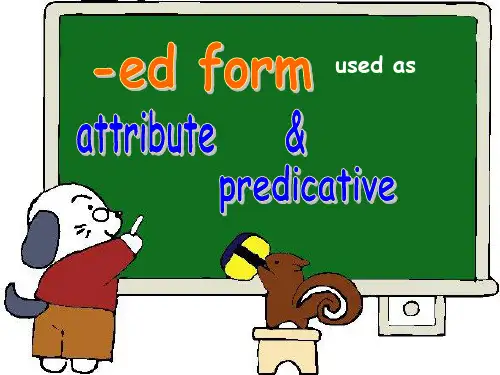
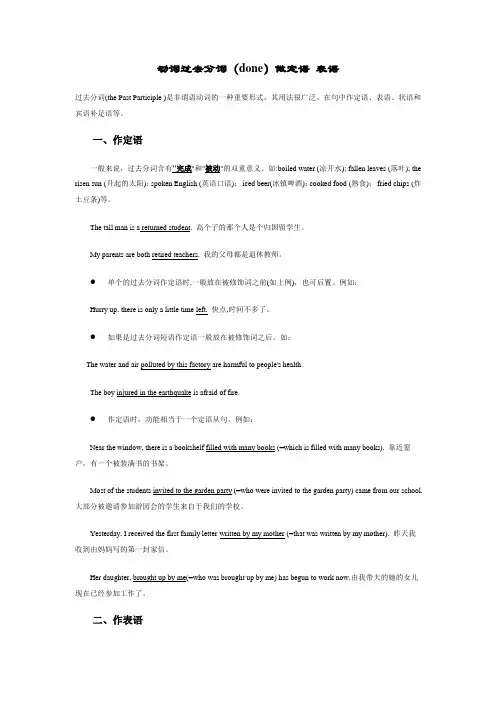
动词过去分词(done)做定语表语过去分词(the Past Participle )是非谓语动词的一种重要形式,其用法很广泛。
在句中作定语、表语、状语和宾语补足语等。
一、作定语一般来说,过去分词含有"完成"和"被动"的双重意义。
如:boiled water (凉开水); fallen leaves (落叶); the risen sun (升起的太阳);spoken English (英语口语);iced beer(冰镇啤酒);cooked food (熟食);fried chips (炸土豆条)等。
The tall man is a returned student. 高个子的那个人是个归国留学生。
My parents are both retired teachers. 我的父母都是退休教师。
●单个的过去分词作定语时,一般放在被修饰词之前(如上例),也可后置。
例如:Hurry up, there is only a little time left. 快点,时间不多了。
●如果是过去分词短语作定语一般放在被修饰词之后。
如:The water and air polluted by this factory are harmful to people's health.The boy injured in the earthquake is afraid of fire.●作定语时,功能相当于一个定语从句。
例如:Near the window, there is a bookshelf filled with many books (=which is filled with many books). 靠近窗户,有一个被装满书的书架。
Most of the students invited to the garden party (=who were invited to the garden party) came from our school. 大部分被邀请参加游园会的学生来自于我们的学校。
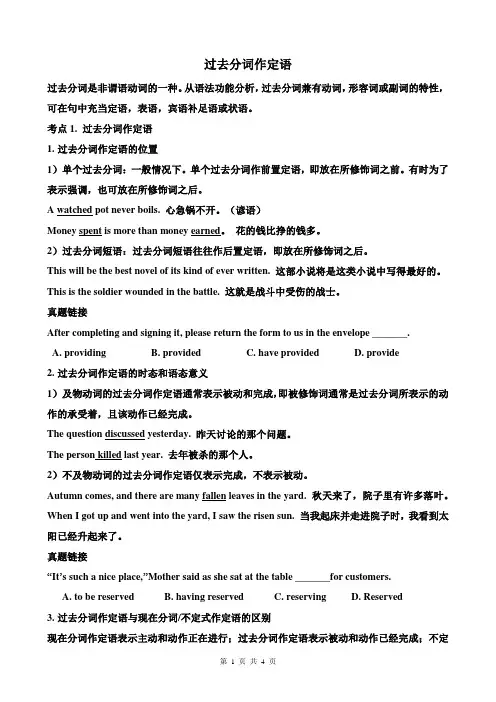
过去分词作定语过去分词是非谓语动词的一种。
从语法功能分析,过去分词兼有动词,形容词或副词的特性,可在句中充当定语,表语,宾语补足语或状语。
考点1. 过去分词作定语1.过去分词作定语的位置1)单个过去分词:一般情况下。
单个过去分词作前置定语,即放在所修饰词之前。
有时为了表示强调,也可放在所修饰词之后。
A watched pot never boils. 心急锅不开。
(谚语)Money spent is more than money earned。
花的钱比挣的钱多。
2)过去分词短语:过去分词短语往往作后置定语,即放在所修饰词之后。
This will be the best novel of its kind of ever written. 这部小说将是这类小说中写得最好的。
This is the soldier wounded in the battle. 这就是战斗中受伤的战士。
真题链接After completing and signing it, please return the form to us in the envelope _______.A. providingB. providedC. have providedD. provide2.过去分词作定语的时态和语态意义1)及物动词的过去分词作定语通常表示被动和完成,即被修饰词通常是过去分词所表示的动作的承受着,且该动作已经完成。
The question discussed yesterday. 昨天讨论的那个问题。
The person killed last year. 去年被杀的那个人。
2)不及物动词的过去分词作定语仅表示完成,不表示被动。
Autumn comes, and there are many fallen leaves in the yard. 秋天来了,院子里有许多落叶。
When I got up and went into the yard, I saw the risen sun. 当我起床并走进院子时,我看到太阳已经升起来了。
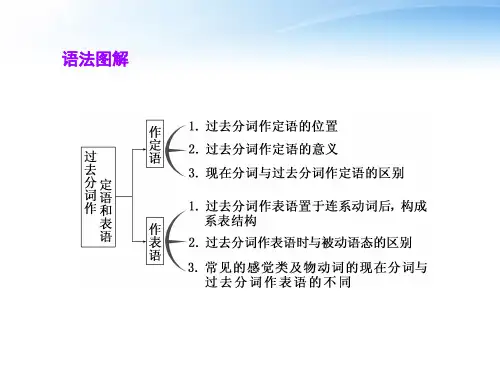
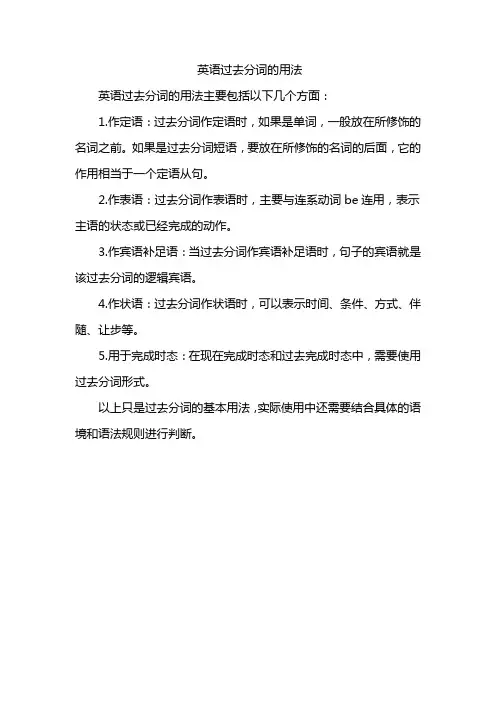
英语过去分词的用法
英语过去分词的用法主要包括以下几个方面:
1.作定语:过去分词作定语时,如果是单词,一般放在所修饰的名词之前。
如果是过去分词短语,要放在所修饰的名词的后面,它的作用相当于一个定语从句。
2.作表语:过去分词作表语时,主要与连系动词be连用,表示主语的状态或已经完成的动作。
3.作宾语补足语:当过去分词作宾语补足语时,句子的宾语就是该过去分词的逻辑宾语。
4.作状语:过去分词作状语时,可以表示时间、条件、方式、伴随、让步等。
5.用于完成时态:在现在完成时态和过去完成时态中,需要使用过去分词形式。
以上只是过去分词的基本用法,实际使用中还需要结合具体的语境和语法规则进行判断。
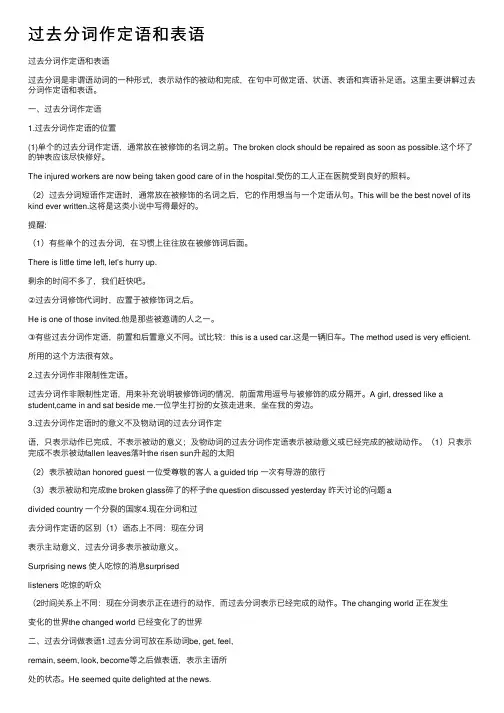
过去分词作定语和表语过去分词作定语和表语过去分词是⾮谓语动词的⼀种形式,表⽰动作的被动和完成,在句中可做定语、状语、表语和宾语补⾜语。
这⾥主要讲解过去分词作定语和表语。
⼀、过去分词作定语1.过去分词作定语的位置(1)单个的过去分词作定语,通常放在被修饰的名词之前。
The broken clock should be repaired as soon as possible.这个坏了的钟表应该尽快修好。
The injured workers are now being taken good care of in the hospital.受伤的⼯⼈正在医院受到良好的照料。
(2)过去分词短语作定语时,通常放在被修饰的名词之后,它的作⽤想当与⼀个定语从句。
This will be the best novel of its kind ever written.这将是这类⼩说中写得最好的。
提醒:(1)有些单个的过去分词,在习惯上往往放在被修饰词后⾯。
There is little time left, let’s hurry up.剩余的时间不多了,我们赶快吧。
②过去分词修饰代词时,应置于被修饰词之后。
He is one of those invited.他是那些被邀请的⼈之⼀。
③有些过去分词作定语,前置和后置意义不同。
试⽐较:this is a used car.这是⼀辆旧车。
The method used is very efficient.所⽤的这个⽅法很有效。
2.过去分词作⾮限制性定语。
过去分词作⾮限制性定语,⽤来补充说明被修饰词的情况,前⾯常⽤逗号与被修饰的成分隔开。
A girl, dressed like a student,came in and sat beside me.⼀位学⽣打扮的⼥孩⾛进来,坐在我的旁边。
3.过去分词作定语时的意义不及物动词的过去分词作定语,只表⽰动作已完成,不表⽰被动的意义;及物动词的过去分词作定语表⽰被动意义或已经完成的被动动作。

News surprises listeners Movie excited children Grammar(一) 过去分词做定语和表语一、过去分词的含义过去分词有过去分词有“被动”“被动”或“完成”的意思,及物动词的过去分词既表被动也表示完成,但有时只表被动;不及物动词的过去分词只表完成。
如:但有时只表被动;不及物动词的过去分词只表完成。
如:a broken heart 一颗破碎的心(被动和完成)一颗破碎的心(被动和完成)a ploughed field 犁过的田地(被动和完成)犁过的田地(被动和完成)a risen sun 已升起的太阳(完成)fallen leaves (落叶)(完成)(完成)二、过去分词做定语1、单个的过去分词一般作前置定语,即通常放在所修饰的名词前,过去分词短语一般做后置定语,即通常放在所修饰的名词后。
如:一般做后置定语,即通常放在所修饰的名词后。
如:tenified people.; the affected person ; ordinary people exposed to cholera. the river polluted by the dirty water from London ★[注意]:★1.有些单个的过去分词,像left(剩余的(剩余的 given(所给予的)concerned(有关的)等,习惯上用作后置定语。
如:等,习惯上用作后置定语。
如:the money left (剩余的钱)(剩余的钱) the people concerned 有关人士有关人士the time given 给出的时间给出的时间[高考点击] For breadfast he only drinks juice from fresh fruit _______ on his own farm.(2009年北京)A. grown B.being grown C.to be grown D.to grow ★2.过去分词作定语和现在分词做定语的区别,现在分词和过去分词作定语来修饰名词,区别主要表现在语态和时间关系上。
过去分词用法总结过去分词是动词的另一种非限定形式,在句中可以作定语、表语、宾语补足语和状语。
一、过去分词作定语1. 一般情况下,单个分词作前置定语,过去分词短语作后置定语。
如:a used car旧车,a playground built last year去年修建的一个操场。
2. 及物动词的过去分词表示“被动”和完成”。
Many people questioned refused to answer. 被问的许多人都拒绝回答。
Five people won the “China’s Green Figure” award, a title given to ordinary people for their contributions to environmental protection. 五人获得了“中国绿色人物奖”,这是一个颁给对环保有贡献的普通人物的奖项。
3. 不及物动词的过去分词作前置定语,只表示“完成”,不表示被动。
如:the risen sun已升起的太阳,fallen leaves落叶。
4. astonish, disappoint, encourage, excite, frighten, interest, move, please, puzzle, satisfy, surprise, tire等表示心理状态的动词的过去分词作定语,表示被修饰的词所具有的特征,意为“感到……的”。
(其现在分词表示所修饰的词本身所处的状态,意为“令人……的”)。
Mr. Smith, tired of the tiring speech, started to read a novel. 史米斯先生厌倦了乏味的演讲,开始读小说。
This is a boring lecture. 这是一个令人厌烦的报告。
The excited children couldn't go to sleep all night long.这些兴奋的孩子整个晚上无法入睡。
高中英语语法中过去分词作定语和表语发布时间:2006-10-10 13:41:00 | 信息来源: | 浏览:过去分词作定语和表语过去分词作定语,在语态上,表被动;在时间上,表示动作已经发生或完成,与它所修饰的名词有逻辑(意义)上的动宾关系。
过去分词作定语时,所修饰的名词在逻辑上相当于被动句中的主语,过去分词相当于谓语。
过去分词作定语表示动作在谓语动作之前发生,已经完成并具有被动意义。
有时也不表示时间性。
作定语的过去分词一般由及物动词变来,因为只有及物动词才有被动意义。
例如:He is a teacher loved by his students. 他是个很受学生爱戴的老师。
也有用不及物动词的过去分词作定语的情况,一般作前置定语,它不表示被动意义,只表示主动意义,强调动作完成。
不能像及物动词的过去分词那样放在名词后面作定语。
例如:fallen leaves 落叶retired workers 退休工人the risen sun 升起的太阳注意下面过去分词作定语的几种情况:1. 单个的过去分词作定语一般放在被修饰的名词之前。
例如:We needed much more qualified workers. 我们需要更多的合格的工人。
My friend is a returned student. 我的朋友是个归国的留学生。
单个分词也可以作后置定语,用以强调动作。
例如:They decided to change the material used. 他们决定更换使用的材料。
2. 过去分词短语作定语要放在被修饰的名词后面,作后置定语,其作用相当于一个定语从句。
例如:The student dressed in white is my daughter.=The student who is dressed in white is my daughter.)穿白色衣服的学生是我的女儿。
3. 如果被修饰的词是由every/some/any/no + thing/body/one所构成的复合代词或指示代词those等时,即使一个单一的分词作形容词用,也要放在被修饰词的后面。
概念引入今天我们要学习过去分词作表语和定语的用法。
先看下面这些句子:1. But he became inspired when he thought about helping ordinary people exposed to cholera.(inspired过去分词作表语;exposed过去分词作定语)2. So many thousands of terrified people died every time there was an outbreak.(terrified过去分词作定语)3. He became interested in two theories that possibly explained how cholera killed people.(interested 过去分词作表语)4. From the stomach the disease quickly attacked the body and soon the affected person died.(affected过去分词作定语)5. He was determined to find out why. (determined过去分词作表语)6. He found that it came from the river polluted by the dirty water from London.(polluted过去分词作定语)上面句子中的黑体词都是过去分词,句1(inspired)、句3、句5中的三个词跟在系动词became、was后作表语;而句1(exposed)、句2、句4、句6中的四个词放在名词前或后修饰名词,作定语。
那么过去分词是什么?有什么作用?我们将在本单元和下两个单元中与同学们一起学习。
用法讲解过去分词的作用英语中动词如果不作谓语时叫非谓语动词。
非谓语动词分为:不定式(to do)、动词-ing形式(doing)和过去分词(done)。
动词-ing形式可分为现在分词和动名词:现在分词强调动作,如a sleeping boy中的sleeping强调“睡觉”这一动作,而且此动作正在进行,与所修饰词boy有逻辑上的主谓关系(即sleeping的动作是boy做的),因此是现在分词作定语;而a sleeping bag中的sleeping强调功能,表示“用来睡觉的”,是动名词作定语。
过去分词多表示动作的被动和完成,但要注意不及物动词的过去分词常表示“完成”的动作,而不表示“被动”意义。
本单元主要学习过去分词作表语和定语。
1. 与助动词一起构成谓语:1)过去分词与have/ has/ had一起构成完成时,如:Haveyou ever been to abroad before? 你以前出过国吗?(现在完成时)The roads were full of people. We hadn’t thought of that. (过去完成时)路上到处都是人。
我们之前没有想到这一点。
2)过去分词与be动词一起构成被动语态。
Will the goods be delivered to us on time? 这些货物能按时交付给我们吗?These books are not intended for children. 这些书不是为孩子们设计的。
2. 非谓语动词用法作为非谓语动词在句子中作定语、状语、表语和宾语补足语。
1)作表语:I am awfully worried, because Daddy is ill.我很着急,因为爸爸病了。
2)作定语:She had a worried look on her face. 她满面愁容。
3)作宾语补足语:She wanted the work finished by Friday. 她要求这工作星期五前完成。
4)作状语:They came in, followed by their wives. 他们走了进来,妻子们跟随在后。
Convinced that they were trying to poison her, she refused to eat anything.她认为他们想毒害她,便拒绝吃任何东西。
过去分词作定语1. 过去分词作定语的位置单个过去分词作定语时,多放在被修饰词前,而分词短语多放在被修饰词后。
Martin’s confused sorrows turned to optimism. 马丁烦乱的悲哀情绪转而变成了乐观情绪。
The play put on by the teachers was a big success. 老师们表演的戏很成功。
注意:有些单个的过去分词,习惯上要放在被修饰词后面;过去分词如果修饰代词时,也多放在被修饰词后。
There is little time left. Let’s hurry up. 剩下的时间不多了,我们赶快吧。
He is one of those invited. 他是被邀请的人之一。
2. 过去分词作定语时的意义:首先我们研究一下这些例句:1)She had a worried look on her face. 她脸上有担心的表情。
2)The frightened horse ran away from the fire. 恐惧的马逃离了大火。
3)She had confused feelings about him. 她对他的感觉有点迷惑。
4)He wore an embarrassed expression. 他一副尴尬的表情。
句1)中worried修饰“look(表情)”。
也许你还记得老师说过:物时要用-ing形式,人就用-ed形式,初中时老师会这样讲,如:I’m interested in the book.The book is interesting.但是在高中,我们就要思考、分析一下,因为有时事物也会用-ed,而人也可能用-ing。
注意句1),凡是“表情(look/ expression)”一定都是“由里向外”发出的,如:我高兴------pleased look我满意------ satisfied look我担忧------worried look什么时候人可能用-ing形式呢?如:看到一个可爱的男孩儿跑过来了,我们可以说:The boy is interesting. 再如: She is frightened. -----表示“She”胆子小,很害怕,是内部的感觉;但是如果“She”长得像个妖怪呢?就该是“She is frightening.”了,指的是horrible(吓人的)。
句2)中the frightened horse指受到惊吓的马,是马内在的感受;不指马长得难看。
同样,句3)中confused feelings也是指内在的感受;句4)中an embarrassed expression是由于内心的尴尬而发出的表情。
再看下面的短语中的过去分词:使某人/自己受伤,乘客“被使受伤”的,此处更强调“完成”小结:1)及物动词的过去分词作定语时,被修饰词经常是过去分词动作的承受者,即逻辑上的动宾关系,此时过去分词表示被动,有时还表示动作的完成。
此时过去分词与其附属成分(宾语或状语等)相当于定语从句。
He found that it came from the river polluted by the dirty water from London (=which had been polluted by the dirty water from London).他发现水是从被伦敦排出的脏水污染了的河里来的。
(表示被动和完成)It’s said that an honoured guest will be here in half an hour. (只表示被动)据说半小时后有位受尊敬的客人就到了。
2)不及物动词的过去分词作定语,只表示动作已经完成。
vanished jewels消失了的珠宝 a retired teacher 一位退休教师3. 现在分词和过去分词作定语的区别:1)语态上的不同注意被修饰词与分词动作的关系:现在分词表示主动,即现在分词动作是被修饰词做的。
过去分词表示被动,即被修饰词是过去分词动作的承受者。
对比:spoken English 英语口语(英语是被说的)an English-speaking country 一个说英语的国家(国家的人说英语----主动)再如:a simply-furnished room 装修简单的房间(房间被装修)a fast developing country 快速发展的国家(国家发展----主动)2)时间关系上的不同现在分词表示正在进行的动作,而过去分词多表示已经完成的动作。
the changing world 正在发生变化的世界the changed world 已经变化了的世界再如:the house being built正在建造的房子the house built in 2010 2010年建造的房子过去分词作表语1. 过去分词放在系动词be, get, feel, remain, seem, become等后作表语, 多为及物动词变化而来的,有被动意味,表示主语所处的状态。
He became annoyed with the students. 他非常生学生的气。
Are you married or single? 你是已婚还是单身?He seems well qualified for the job. 他好像非常胜任这个工作。
2. 少数不及物动词的过去分词也可以作表语,只有完成的意思,也说明主语所处的状态。
Gone are the days(=The days are gone)when my heart was young and gay.我的心又年轻又愉快的日子一去不复返了。
The sun is set. Let’s go home. 太阳落山了,我们回家吧。
3. 过去分词作表语与被动语态的区别:过去分词作表语表示状态,而被动语态表示被动的动作。
The cup is broken. 那个茶杯打碎了。
(指茶杯现在的状态,系表结构)The cup was broken by Tom when he took it to the living room.(指过去动作,被动语态)那个是汤姆打碎的,当时他正把它拿到客厅去。
4. 与感觉有关的动词的现在分词和过去分词的区别:在过去分词作定语部分我们已经涉及到这些词的用法了,下面是从动词角度去理解的方法。